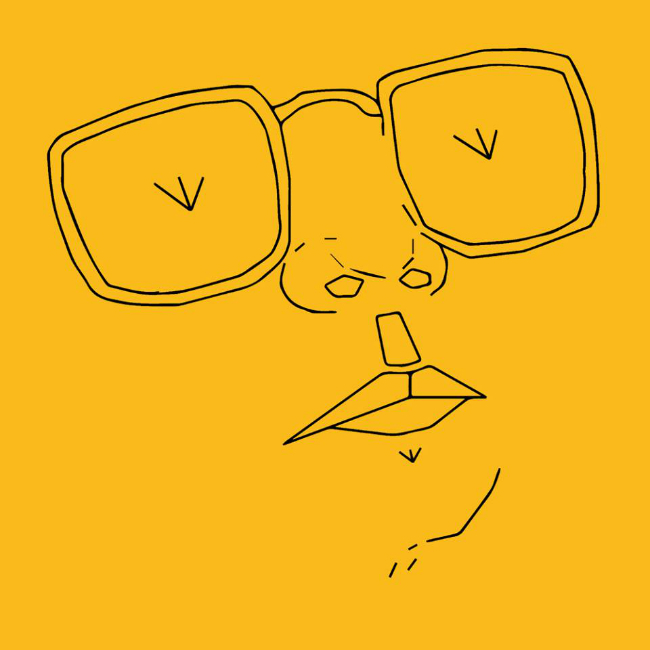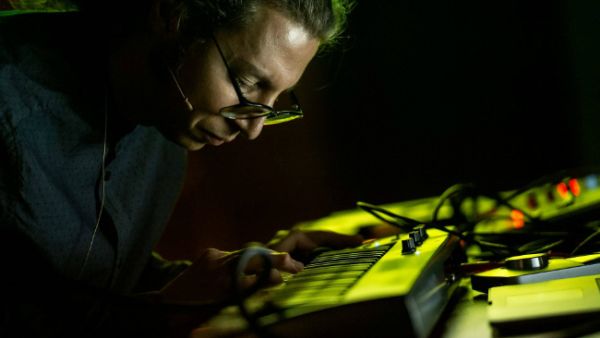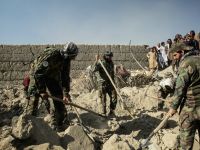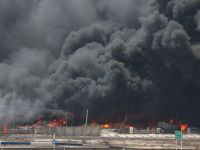Index:
Interview Part 1: On Hello Psychaleppo, Arabic Music, and Life Abroad
Interview Part 2: On the Next Album
Independent Arabic music has been making waves. It’s hard to pinpoint, exactly, when the first ripples began; underground Arabic music has always been interesting, but nothing really made a splash. But things began to change, at least for me, in 2010.
Part of that is the exploration of new ideas and new forms without loss of identity. For every band out there that essentially plays Metallica in Arabic, there are those who choose to chart new waters. They mostly succeed, but they’re always interesting.
Hello Psychaleppo is one of these.
I first noticed Hello Psychaleppo in late 2014; there was this grotesque yet stylised poster on the wall opposite of the booth I was sitting in, promising a show at Canvas, in Amman, in two weeks’ time. I went to the show with a friend, expecting to see a band; I instead got a guy with headphones.

Above: To be honest, it was a difficult poster not to notice.
But what a guy.
The music he played was wholly Arabic, and yet wholly new. It wasn’t just interesting; it was fun. My friend and I danced despite ourselves, giving ourselves to the music and the music sweeping us up in turn. We rode that wave all the way to the end of the night and then on a dizzy, giddy ride home. Fun? Try fantastic.
And while I haven’t been to another Hello Pscyhaleppo show since—not for lack of trying—I’ve been listening to the music while hoping to get into another show.
Hello Psychaleppo is really a project. The guy with headphones behind the whole thing is named Samer “Zimo” Saem Eldahr, an art school graduate who grew-up in Aleppo, moved to Beirut, and now lives in the US. He’s an adept musician, having performed with rock bands (he considers Iron Maiden an influence) without shunning the tarab music he grew-up with. Hello Psychaleppo is his way of doing something different—something we now call electro-tarab but which, a few years ago, was largely nameless. He’s released a handful of albums under the name.
When the chance to interview Samer came-up, I jumped at it. So did Yazeed, a friend and colleague who had discovered Hello Psychaleppo earlier in the year. It was a meeting of worlds: while my musical tastes are capricious (I spent all week listening to Ibn el Leil and Surfer Rosa), Yazeed is a self-professed hip-hop head and artist who works obscure lyrics into conversation.
Admittedly, we were a little nervous. But we needn’t have been. Behind all the flash and the colossal talent that makes Hello Psychaleppo was one of the most humble, thoughtful, and articulate people either of us has had the pleasure to interview. We talked about Hello Psychaleppo, Samer’s past...and Hello Psychaleppo’s exciting upcoming new album.
This interview was mostly conducted in Arabic, with sporadic forays into English.
**
Karim: Why do they call you Zimo?
Zimo is just a nickname I had since I was a kid. I had a brother who passed away from cancer when I was young and he called me “Zimo.” My name’s Samer. (laughs) I still don’t know how he made the jump to Zimo.
Yazeed: It’s one of those names that came with childhood.
Yeah. There are a few people who just say…people who don’t know my name is Samer. They just call me “Zimo.”
Karim: Even in Aleppo?
Yeah, since I was a kid. Since I was 10, 11. (laughs) So there’s Samer, there’s Zimo, there’s Hello Psychaleppo. I’ve always had these multiple personalities.
Karim: And now too in…(blanking) you’re in Missouri, right?
I’m in Minnesota.
Karim: I’m sorry, Minnesota.
[Zimo] is easier here for them. “Samer” is hard for [Americans] to pronounce…Zimo is easier to say.
Yazeed: I was going to ask: the project is named Hello Psychaleppo. Do people get confused and wonder if you’re in a band or…
I feel this still happens. They’re like, “How many people are you?” and it’s, “Just me,” because [Hello Psychaleppo] is not named after me and it’s not a [specific] project—this has to do with marketing and branding. There are many projects with just one person behind them that just used the same way to market. Aphex Twin—that’s not [anything like] his real name. But he created Aphex Twin, the logos, whathaveyou—his “world.”
Hello Psychaleppo came about like that; the words come together in a nice way. Psychaleppo has a rhythm to it. Psychaleppo and hello: the number of ls and Os [the alliteration].
So it made sense, marketing-wise, even then: I can build-up on this persona, I can build-up on this name.
I don’t know if [the name] works in the long-run, but for now it’s just doing the job.

Above: Hello Psychaleppo performing. (Facebook / Hello Psychaleppo)
Karim: I wanted to ask you about the name, actually. “Psychaleppo” is a portmanteau of “Aleppo” with “psychedelica,” yes?
Y-yyyes. Well, sort of. Psychedelic as a genre, yes.
The genre is very progressive, and “psychedelic” helps you imagine a story, and—
Karim: Ah, see, that was my question. To me, “psychedelic” means—you know, psychedelic. The 1960s. Those LPs with the art. You know what I mean. Psychedelic. [In retrospect, it’s a wonder he did.]
Exactly. This is more like the rock scene back in the day.
Karim: Which is what I know.
But I take the name from the musical aspect. Psychedelic music is very progressive. It’s always taking you to new places. [I chose the name for that] more than I did for psychedelic as a music genre. [I like the] music as a concept…as an idea.
Karim: Something I was curious about.
For sure.
Karim: You studied fine arts in Aleppo. When you say you like the music as an idea, which sounds like a very [theory-based] thing to say, the jargon of art students…Does your idea of psychedelic music conceptually come from your time as an art student in Beirut or is it something inspired by [art theory] at university, or—?
The name Psychaleppo comes from…I was very interested in the forms and arrangements of psychedelic music. How the music is [structured] with its solos and how it takes you to certain places, how its intros are so different to its outros. It’s very progressive; the music is changing all the time [in the same song]. I found the idea for Hello Psychaleppo there.
If you listen to my music, there’s a lot of experimentation with forms. How a song starts and where it arrives and how it ends. Sometimes, there are parts that don’t repeat in a track. It’s not the commercial way of executing. [In songs] there’s always a chorus or some other element which I don’t necessarily have in my music. Not because I don’t want them, but because of how I write the music and where I use the samples and where stuff goes [is based on] this concept. Like, if you listen to a Led Zeppelin, their songs start in one place and end in another, with a five-minute solo. There’s a higher emphasis on form, there’s more music than there is [focus on] a standard structure to work with.
The name of the project happened in Aleppo itself, in 2010, I think…I had a few tracks. I played music in a bunch of bands. I played rock. Guitar. Keyboard. I sang. But during this, I worked on solo projects at home, which was Hello Psychaleppo.

Above: Hello Psychaleppo's second album, which is when things gelled.
Over time, I accumulated a bunch of tracks, and I put those up on Soundcloud. I was at the University of Aleppo’s College of Fine Arts…It started as a very independent project.
Then I went to Beirut, where the work found itself.
Karim: You dropped an album before going to Beirut.
The first album, yeah. I was in Aleppo in 2012. A few people in Beirut heard it. The album isn’t online anymore. It was a trial, a way of testing the waters.
I took it offline when I had a better idea of what I was doing. I better understood the tools I had, better understood the project’s identity—all the big questions. I took it seriously.
Karim: [That’s] when I discovered you. In 2014, I saw you perform at Canvas in Amman.
Ohhh, nice! That was a good show.
Karim: That was a good show! I was supposed to see you in London that year, at the Shubbak Festival, but that didn’t pan-out.
Oh, nice. Canvas was good! So was Shubbak.
Karim: You didn’t go to Shubbak this year, no?
No, I didn’t. I think Tania Saleh and Rayess Bek did, though.
Yazeed: Regarding Rayess Bek and hip-hop artists, I know you worked with a hip-hop artist named Ray al Jundi.
Jundi! Yeah, Jundi Majhul.
Yazeed: What’s your relationship like with hip-hop artists and the hip-hop community? Do you feel your genre has a connection with hip-hop music?
I’m a hip-hop head, ever since I was 10. My older brother, rest in peace, listened to hip-hop a lot…After I left to Beirut, I discovered this scene where people were doing just amazing work. During that period, Jordan sprouted a fantastic hip-hop scene of its own. Egypt, too. Each country seemed to have its own style. The flow is different, the genre is different. Some was political, some was a bit more subtle about it. Suddenly you had Arabic rap, which was—ouf.
The biggest scene in alternative music right now is hip-hop. A lot of people are doing really great work. There’s quality. And because I love this stuff and have since I was kid, I’ve met some really great people [just being a fan] who are doing really great work.
Yazeed: Who are some hip-hop artists that you’ve worked with?
I worked on a track with El-Far3i. I worked with Nasser Deen al-Touffar. Jundi Majhul. Darwish, a guy from Homs. We worked on a bunch of events together live. There’re recordings I worked on with Mehrak, with Raed Ghnaim, Al Asli, from Deir ez-Zor. I’m also working right now with Omar Offendum. There’s also Paleface, from Finland, old rapper who I worked with on a project. It’s a band with hip-hop with a big band orchestra. It was really cool.
Nowadays I get to work sometimes with others. But until now I didn’t commit to producing a whole project [with] an artist. I’m still too busy with my own work to take that up, but I imagine Nasser Deen al-Touffar…I could be co-producing with someone else on his new album.
Yazeed: So you can say the work with Jundi and El Fer3i—I [heard] that on your Soundcloud—we’re gonna be seeing more of that.

Above: Fer3i and Hello Psychaleppo. (Facebook / Hello Psychaleppo)
Totally. In the hip-hop scene. Well, I can’t imagine restricting myself too much, but I can see myself doing something more…well, with fewer people [and more focused]. But these people are on top of the list. Fer3i. Jundi. Nasser. Al Asli is doing really great stuff.
Karim: In terms of practicalities, a lot of your inspirations seem to be Arabic.
Yeah.
Karim: I know you like AC/DC and Iron Maiden, but now that you’re living in Minnesota, how’s your access to Arab culture? And how’s your relationship to Arab culture changed now that you’re living in a non-Arabic country?
Hmm.
Karim: This is your first time in a non-Arab country, I think?
(thoughtfully) Yeah, it is.
I think the stuff that really changes is more on a day-to-day basis. Like suddenly you open the radio and there isn’t a single Arabic song on there. Or like TV. It’s these little things that you realize have left your life. Easy access to culture is gone.
I do spend a lot of time inside my room, just working. I don’t feel outside the culture completely. Like, in terms of social activities, I’ll run into a Palestinian here, someone else here…But with no family, or even [the extent of the social activities], it’s definitely gone.
So yeah, I’m a little bit more removed [from Arab culture] than I was. But not in a way that’s affected me in a…(considers)
Karim: Obviously negative way.
Yeah. It helps that I’ve lived most of my life in the Arab world. It’s not like I left when I was 10. I came here to when I was aware and mature and with a background. I’m just trying to adapt to a newer place. I don’t imagine, culturally, this would affect me as much.

Above: A fabulous self-portrait.
Karim: But don’t you think that affects you commercially? Someone sampling Umm Kulthum or tarab in Syria is very different to doing the same in Minnesota.
Exactly. How people reflect on my music, is obviously very different here.
The audience here—you’re starting from zero. America is a place completely isolated from the world. Europe, because of migration, just the number of people who went into Europe, has become at least more open to our music. The current Arab market is the Arab world and Europe, mostly. But there’s an ocean to America. So there’s a disconnect.
But the good thing is that in the music I make, there’s an electronic element. It’s an international language right now, electronic music. [Audiences] connect with that.
There are a lot of rhythms we use—like reggaeton, for example. (imitates a drum) Boom, taktak—boom, taktak. That’s a dabke rhythm, but also reggaeton. There are a lot of places where hip-hop has rhythms spliced in. Plus, I like hybrids. Say, something Arabic, but with drum and bass at the end of the track, as part of the build-up. [Audiences] connect with the melodic, rhythmic, electronic part of that: anything above that is more, “Ouf, this is new. What melody is this? What are these vocals or phrasing coming out?” At which point it becomes a matter of taste.
But generally, people seem happy. And now I’m able to kind of travel a little inside Minnesota, at least locally, which is great. I told myself it’d take two or three years to start somewhere, and it’s…(trails off)
Karim: Baby steps.
Baby steps. But at least, you know, I can start somewhere. America is such a—it’s very challenging. There are a lot of people working in electronic music. You feel like you really need to be on top, even in technical aspects.
The new album…I haven’t released anything in two years like usual because I’ve been focused on quality.
Yazeed: We heard about the show in Michigan, the upcoming show. The Arab American National Museum.
Yeah!
Yazeed: Are you excited about that? Playing for an Arabic audience?
The exciting thing is that, in America, you don’t get the kind of feedback, [the hype of] “Yeah, we’re coming! Woo!” In Michigan, in Dearborn, there are many Arabs and I can see the feedback like, “Ah, yes yes! He’s coming!” (laughs) I just kind of go, “Ouf, where am I?”
(Everybody laughs)
That’s really nice. I imagine the [Museum] is going to be great to play at. There’s an audience…it can be a place where you can really have a tiny fanbase, at least.
Yazeed: You’ve definitely been around Middle Eastern audiences, and they must have really liked your music. And maybe one of the reasons is, you know, the Arabic background. For Arab-Americans, do you think this might open a door for them, because they’re not too used to modern Arabic music?
I would say they would be an easier audience to satisfy more than Middle Easterners in the Middle East.
[People in the Middle East] have listened to a lot of this stuff [and its roots], so their judgment can be harsher. Like, “Oh, you’re doing this to Arabic music here, why?” and we enter that debate. Whereas here I think they’re already exposed to the Western culture, electronic part of the music. They see the work as something returning them to their roots. It’s much easier for them to accept the music and be a part of it than people in the Middle East.
[At most of my Middle Eastern shows], they could even latch on to details. Plus they got the language. My samples are all Arabic. Here, people sometimes miss-out on something. There, no. I play in Arabic, and I choose the sample I’ll play, and I know how people will receive it. Here, it doesn’t matter so much what track I’ll be playing.
Karim: Do you think there’s anything else that’s different between playing for Arabs and Americans? I was reading an article today about how [the West] perceives anything “weird” as World Music. And now that you’re World Music, do you feel like, because of the way some American named Ashley receives your music is different to an Alia, your relationship to your audience has changed?
(thinking) I think the way I approach my music is much more…I go to a much more specific place than a broad one. I’m fully aware I’m working in electro-tarab. I’m working on making it more accepted, maybe? Like on how to develop it, work maqam in there, more Eastern influences. But it’s still EDM, it’s Electronic Dance Music. So to really find the right formula, the right balance of elements in the music, it’s very challenging.
So…I put a red line here. The people listening can make their own judgments, I don’t really care. I just have to make sure the music isn’t too hybrid.
It’s like I go to an Arab place here to eat shawerma and instead I get something else. Because there’s a compromise. We’re in America, therefore…
But my strength is in not being like that. Because there are so many people here working in electronic music, and there are new genres every day. So no: this is what I do, this is how I work. How stuff develops afterwards, well: this is my red line [that] I can’t really cross. Once I cross it, I’ll become like everyone else.
Yazeed: In regards to you [talking about judgment], your music doesn’t have a lot of lyrics…but do you feel like through your instrumentation there’s a specific message you want to deliver to your audience?
Like through samples?
Yazeed: Whether it’s for your culture, or youth audience, or something you’re trying to say.
Karim: Whether visceral or intellectual.
I would say the use of the samples or why I use old Arabic samples is archiving…I think I’ve used one track that’s known, “Touba,” by Abdel Halim. But generally I choose songs that are unfamiliar or unknown, you know, not really used or listened. Old enough that they’re heritage.
I think we come from a region in the world that’s subject to constant attack: culturally, on the ground, whatever. We’re not as organized as Europe and the States in archiving. If I want to use this sample, there’s no company to go to so we could talk or a way to use anything at any time within some sort of organized system.
Above: It's true: the Hello Psychaleppo Facebook page is full of images of old Arabic art and music.
Because of this, in some places, we’re losing our heritage slowly, without realizing.
So [to a degree], it serves a purpose. I’m using old Arabic songs so [people] connect. Well, first I connect with the song.
Youth…there’re a lot of kids today who don’t know anything [about their heritage]. Kids born in Syria who were born at the beginning of everything, they’ve turned seven since everything started and they’re in Europe or. We have a generation [that doesn’t know about its heritage], and even I’m affected as well…
We’re not on the land, but we carry the culture. So I think it serves a purpose to use these old samples. There’s a point in doing that. At this point, I can easily get in touch with artists. I can get beautiful voices to work with me, tarabiyyeh. But I don’t really feel like I wanna do that. Because sampling serves a purpose. It’s an art form, and I’m just applying them to modern tools. That’s what I do.
Next: We discuss the upcoming album—and get a preview.
Read related stories:







